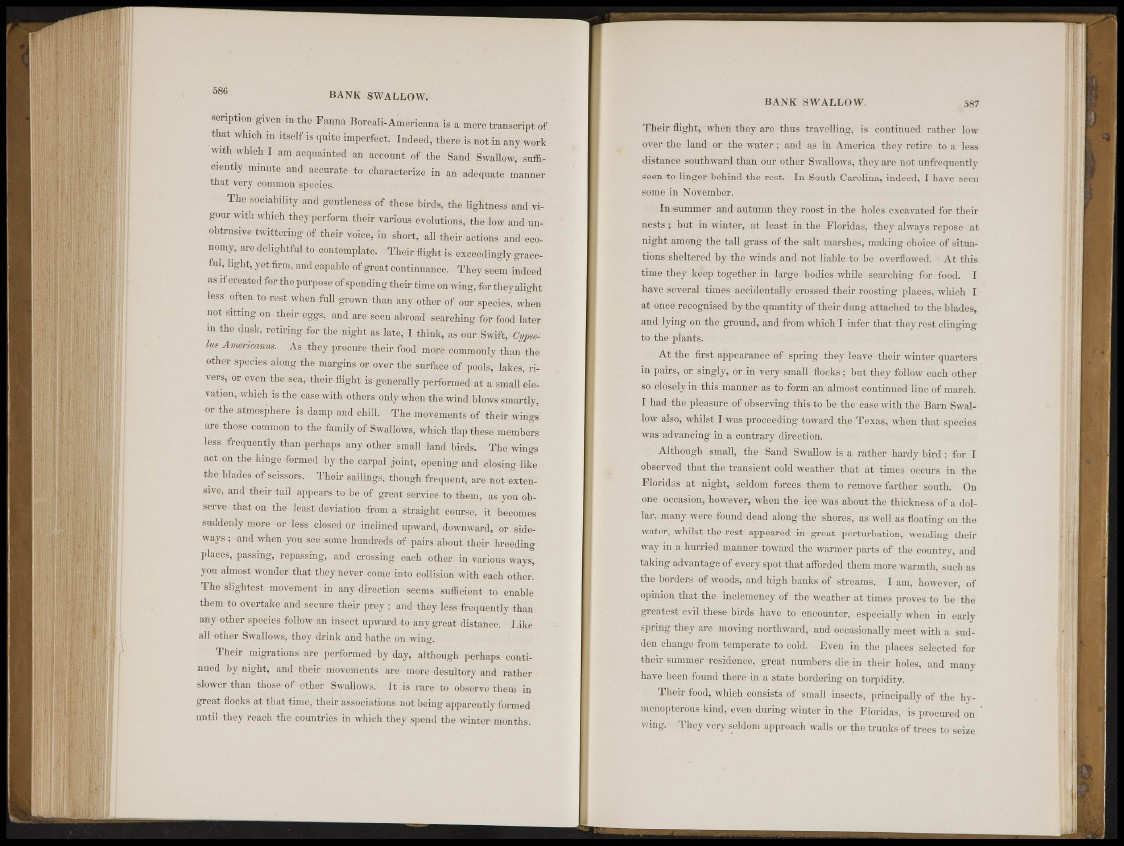
586 BANK SWALLOW.
smpto.n ¡Then in the 1-Vuna iioreali Americana is a mere transcript of
that which initeelfi s quite imperfect,- Indeed, there is not in any work
With which I an, acquainted an account of the -Sand Swallow, suffic
e , % -minute and' accurate ^characterize in an- adequate maimer
that very common species. • -
T i e sociability ami gentleness of these birds, the •%«.„<*» and vigour
with %vhich they perform their various evolutions, «Mo w aniunohtrusive'twittering
of their voice;<in> short, all their actions and economy,
are delightful to contemplate, fflieirffight is exceedingly,gracefill,
light, yet firm. an,l capable of groaf continuance. They-seem indeed
as ifcreated tor the p u r p l e of spending their time on »i„g, f„r t}1(!y «Jight
less often t o rest, when f f f l . g twn tha,, any other of. our species, when
not sitting on their eggs, and are seen abroad searching for food later
» t h e dusk, retiring for the n i g h t s late, I think, as our Swift,
1ms Americmm. As they procure their food mor§ coa4only than tfie
other species along the margins or over the surfa'ce of pools,. lakes, rivers,
or even the sea, their flight is- generally perform,.«1.at a small »legation,
which is the case-with others oMy w h e n c e wind hlows smartly,
or • the atmosphere is damp and chill. The movements of •their wings
are those comm^m to the family of SwalloSws, wMch-flap these members
l c s s froqiicntly than porhaps any other small -land birds. • T h e wing«
afct on the Singe formed by the oaf-pal Joint, opening and closing like
the blades of scissors. Their sailings, though frequent, are not esten.
sive,r and their tail appears, to be of great service to them, as you observe
that on the least deviation from a straight course, it tecomes
suddenly wore or less, closed or inclined upward, downward, or sideways,;
and when yon see some hundreds of pairs about their breeding
places, passing, repassing, and, crossing each other in various ways,,
you almost wonder that they never come into collision with each other.
The slightest movement in any (¡¡motion scorns sufficient to enable,
them to overtake and secure their prey ; and they loss frequently than
aiiy other species fqliow an insect upward, t o any groat distal».... I.ike
all other Swallows, they drink and bathe on wing.
• Their migrations are performed by day, although perhaps eonti-
Iiued by night, and their movements are more •desultory and rather -
slower than those of other Swallows. It is two lo observe them in
great flocks at that time, their associations not being apparently formed
until they reach the countries in which they spend the winter months.
BANK SWALLOW. 587
Their flight, when they are thus travelling, is continued, rather low
over the land or the water .; and as in America they retire to a less
distance southward than our'Other Swallows, they are not unfrequently
seen to linger behind the rest. In South Carolina, indeed, I have seen
.some in November.
¡»•summer and autumn they roost in the holes,excavated for their
nests!; but in winter, at least in the Ploridas, they always repose at
night among the tall grass of the salt marshes, making choice of situai
tions sheltered hy the winds and not liable to he overflowed. At this
time thoy keep together in large bodies while searching for food. I
have-several time» accidentally crossed (heir roosting places, which I
at once recognised by the quantity of their dung attached to the: blades,
and lying Ofc the ground, and from which T infer that they rest clinging
to the plants.
At the first appearaneo'of spring they leave their winter quarters
in pairs, or -singly, or in very small flocks ; but they follow each other
go closelyin this manner as to form an almost continued line of march.
I had the pleasure of observing this t o be the-case with the Barn Swallow
alsq, whilst I was proceeding toward the Texas, when that species
was advancing in a con t r an direction.
Although small, the Sand Swallow is a rather hardy bird; for I
observed that the transient cold weather that at times oecurs in the
Ploridas at night, seldom forces them to remove farther south. On
one occasion, however, when the ice was about the thickness of a dollar,
many were found dead along the ¡shores, as well as floating on the
water, whilst the rest appeared in great perturbation, wending their
way in a hurried manner toward the warmer parts of the country, and
taking advantage of every spot that afforded them more warmth, such as
•a»: borders of woods, and high hanks of streams. I am, however, of
opinion that the inclemency of the weather at times proves to be the
greatest evil these birds have to encounter, especially when in early
spring they are moving northward, and occasionally meet with a sudden
change: from temperate to cold. Even in the places selected for
their summer residence, great numbers die in their holes, and many
have been found there in a state bordering on torpidity.
Their food, which consists of small insects, principally of the hymenopteraMs
kind, even during winter in the Floridas, is procured on '
win®'" They very seldom approach walls or the trunks of trees to seize